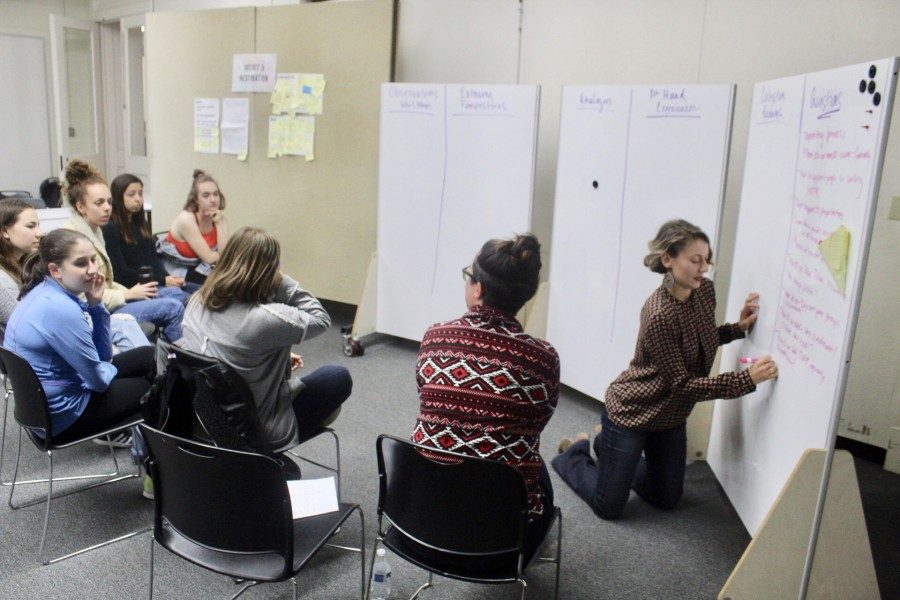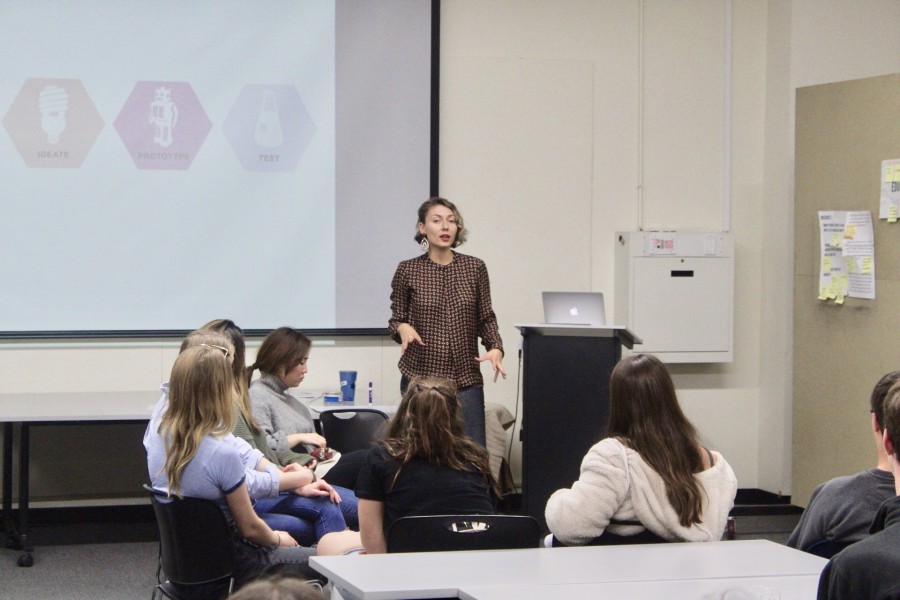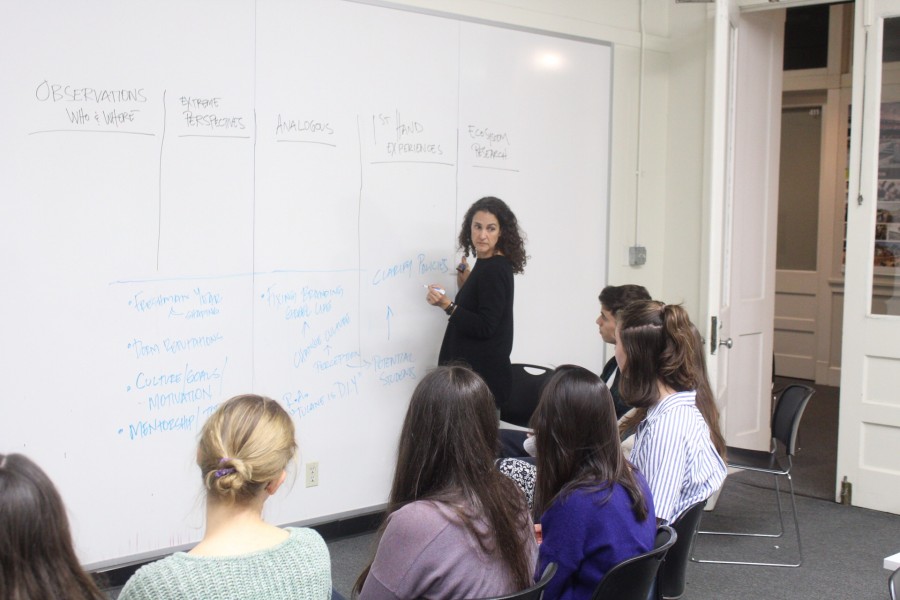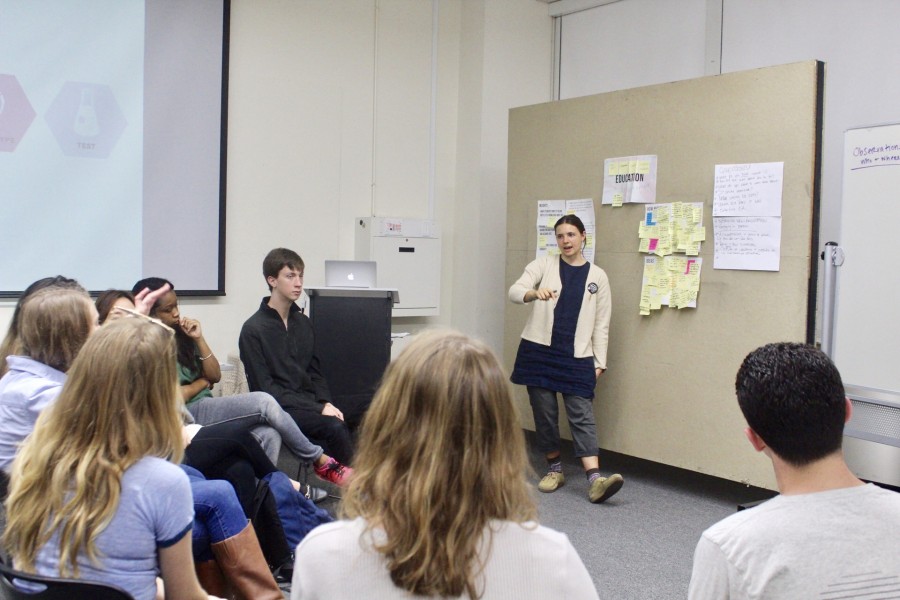Project IX aims to find meaningful solutions to sexual violence
Josh Jessimen | Photography Editor
Co-Design Lead Katie Mathews writes on a notepad as students brainstorm and discuss ideas to combat sexual violence.
Approximately 50 students gather around every Wednesday evening, reading quotations from anonymous Tulane peers about campus culture and sexual assault in the community. They are working together to find solutions to Tulane’s sexual violence problem.
Over the next 10 weeks, these students hope their small ideas will snowball into tangible designs to address the problem of sexual violence on campus.
Based on what they found out in the Climate Survey results, faculty and student fellows from the Taylor Center for Social Innovation and Design Thinking created a student-led project that would sift through the results of the survey and create several tangible solutions for the problem.
As the Climate Survey data was analyzed, a team of experts, including Katie Mathews, co-design lead for Project IX, and Maggie Hermann, project coordinator for Project IX, were hired through the Taylor Center. The team began to scope the project in October, which included collecting primary data surrounding the sexual assault climate on campus and coming up with a way to mitigate the problem.
The primary data collection process comprised interviewing approximately 50 students from a variety of races, backgrounds, gender affiliations and organizations for several hours either one-on-one or in small groups about their experience at Tulane, campus culture and their general attitude toward sex. Mathews said she believed the school will have more long-standing solutions if Project IX is heavily student-focused and student-run.
“… Solutions will be more impactful, more relevant. They will be more quickly adopted if they are designed by the people who use them or need to use them,” Mathews said. “We know that sexual assault is not just about solutions and programs. It is about a culture shift, so this is the work that we want to help facilitate [for] students.”
The process will take the form of a weekly one-credit seminar that will last the remainder of the semester. Students will be working in four teams targeting certain aspects of the project: community and culture, dialogue and empathy, education and empowerment, and justice and restoration.
At the end of the semester, the solutions will be presented to the student body and to the Tulane administration, which will select many for which to provide full funding.
Students can still join the project within the next few days. It is comprised of approximately 50 students from across campus who are interested in making a difference. Though it is technically called a seminar that is worth 1 credit, the classes include activities, workshops and brainstorming sessions with the entire group as well as the smaller teams.
“We have had really strong support from students that we initially interviewed and from many more students who want to participate in this phase of Project IX,” Allison Schiller, adjunct lecturer with the School of Architecture and a project lead for Design Thinking at the Taylor Center, said. “Students seem really enthusiastic and motivated to be able to act in a way that could create a real culture change on campus.”
Project IX does not aim to solve sexual assault through simple solutions, but to consider what is possible in changing the culture from the team’s research in the first semester and how to create these solutions.
“We have both a sense of what’s going on for students and also that strategic underpinning for what’s possible,” Mathews said. “What’s possible in terms of revamping how Tulane educates its students around sex, sexual assault, boundaries and consent? What’s possible in terms of justice and restoration? What’s possible in terms of shifting the community and the community mentorship, structure and the culture here? What’s possible to get people to have healthy dialogue, even if they have differences around these issues?”
Hermann said she hopes that the school’s resources will not limit the project to just this semester, however.
“Hopefully, if it happens again, there are resources for a continued version of what we are doing,” Hermann said.
Your donation will support the student journalists of Tulane University. Your contribution will allow us to purchase equipment and cover our annual website hosting costs.









